commentary Commentary
Commentary: UMNO’s fear that Bersatu could destroy it does have some basis
But UMNO’s plans to cut ties with Bersatu hardly spells the end of Prime Minister Muhyiddin Yassin, says James Chin.
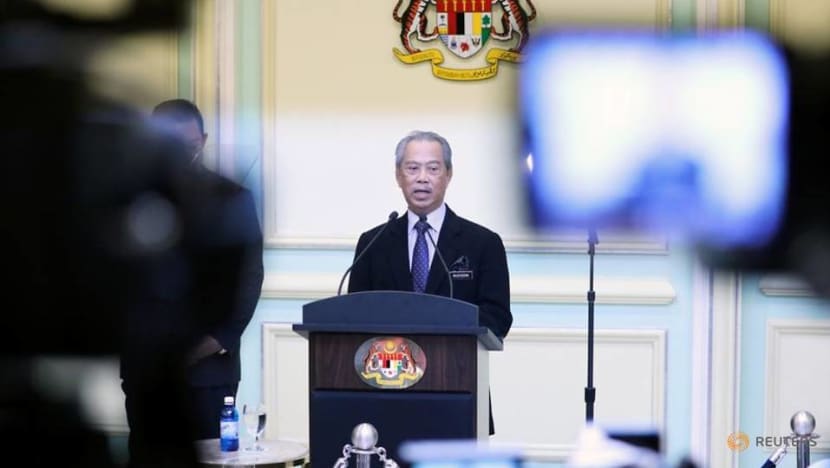
Malaysia's Prime Minister Muhyiddin Yassin speaks during his cabinet announcement in Putrajaya, Malaysia on Mar 9, 2020. (File photo: REUTERS/Lim Huey Teng)
HOBART: Kuala Lumpur saw another high political drama in the past 48 hours, barely a week into the new year.
The UMNO Supreme Council met late Wednesday (Jan 6) night and decided the UMNO General Assembly (GA) held at the end of this month will make a final decision regarding whether UMNO should cut ties with Bersatu, Prime Minister Muhyiddin Yassin’s party.
While the decision suggested the UMNO leadership did not manage to reach a unanimous consensus on this course of action, the three-week breathing space would allow those for and against the withdrawal proposal to rally support for an eventual fight come Jan 31.
CONCERNS OVER UMNO LEADERS STILL INDICTED FOR CORRUPTION
The list of grouses against Muhyiddin and Perikatan Nasional (PN) are long and varied.
But concerns over outstanding court cases involving charges of corruption against many senior UMNO leaders, including party president Zahid Hamidi and the guilty verdict handed out to ex-Prime Minister Najib Razak have been chief in motivating this latest move.
READ: Commentary: This is not the end of Najib Razak
READ: Commentary: Looks like regime change hasn’t altered the Malaysian psyche
UMNO believes that as part of the ruling government, more leniency should be shown towards their court cases. After all, the Attorney-General can issue a discharge not amounting to an acquittal (DNAA).
This legal move would also publicly demonstrate that due process was followed. Yet thus far only two DNAA have been issued for the 11 senior UMNO leaders facing charges.
They see Muhyiddin’s silence on these cases not only as a betrayal but a cunning political strategy to weaken UMNO further.
Beside the fears of being locked up in jail if a guilty verdict, while cases are ongoing, rules prevent indicted Members of Parliament from being appointed to ministerial positions.
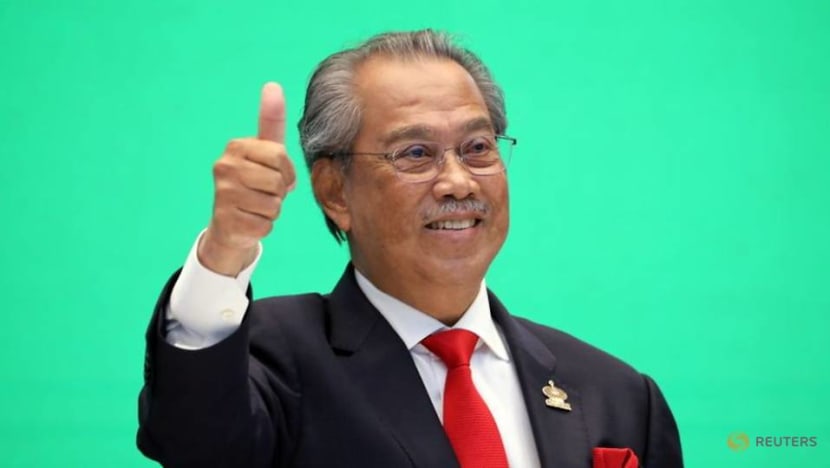
But at the rate these cases are moving, none of these senior UMNO leaders will join the Cabinet until the next General Election, which must be called by 2023, creating even more resentment.
The sprawling set of 1MDB cases has seen the case of 25 more charges totalling RM2.28 billion (US$570 million) against Najib resume this week after a four-month hiatus.
The Malaysian Attorney-General also intends to fix new trial dates for a corruption case against Pontian MP Ahmad Maslan, who just replaced sacked Annuar Musa as Barisan Nasional and Muafakaat Nasional Secretary-General on Tuesday.
READ: Commentary: UMNO’s in no shape to play kingmaker in Malaysia
WORRIES BERSATU COULD DISPLACE UMNO’S POSITION
UMNO is concerned Bersatu’s plans to replace UMNO’s prime position as the party of the Malay heartland is succeeding.
Since Malaysia’s independence in 1957, UMNO has taken for granted that any political coalition it was part of would have only one core Malay party, even if there were other parties representing other ethnic groups. This was the case in both The Alliance and its successor, the Barisan Nasional.
But in the current arrangement, where UMNO have had to share this prime spot with Bersatu (and to some extent, PAS), UMNO fears an eventual, irreversible erosion of this primacy it has managed to hold onto for decades.
READ: Commentary: Malaysia’s political chess games are not over
READ: Commentary: Can the once-mighty Barisan Nasional recover its footing as UMNO decides on its new leaders?
There are strong reasons to think this scenario possible. Bersatu, after all, shares the same DNA as UMNO.
Its founder was Mahathir Mohamad, UMNO’s longest serving Prime Minister. Its political ideology of Ketuanan Melayu (Malay supremacy) is the same as UMNO’s.
UMNO grassroots too have grown more restless and unhappy with Bersatu. Bersatu operatives and ground-up groups are expanding into core rural Malay constituencies long considered UMNO strongholds.
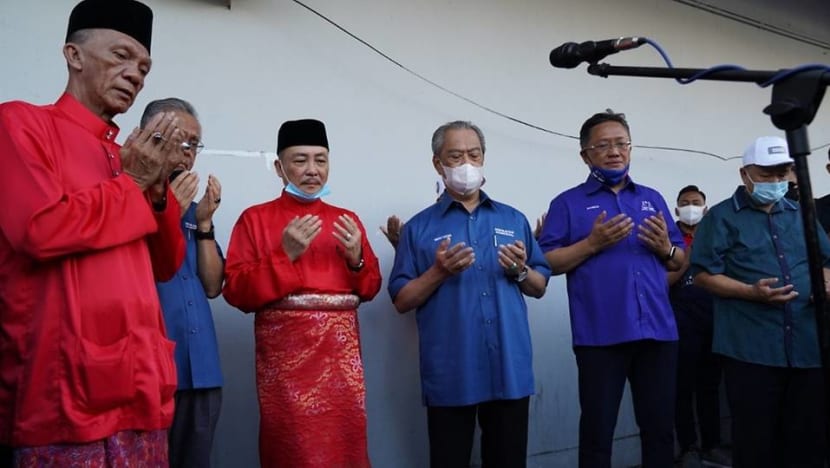
Taking a leaf out of Mahathir’s book when he managed to pull this off in 2019 in engineering a defection of seven UMNO MPs, they do this by offering incentives such as appointments to the village security committees (JKKK) to exiting UMNO activists and members to defect.
Bersatu is seeding such efforts to set up party branches in traditional Malay heartlands to strengthen its position before it negotiates seat distribution with UMNO and PAS when the next GE comes around.
Bersatu’s secretary-general Hamzah Zainuddi openly said on Dec 31 he is targeting the setting-up of several thousand new branches over the next year.
Obviously, you can only ask for a seat if you have a branch in that particular constituency. Hence, the rush by Bersatu.
READ: Commentary: Why Anwar Ibrahim’s longheld dream of becoming Malaysia PM keeps getting thwarted
FRUSTRATION OVER MARGINALISATION IN GOVERNMENT
The way UMNO sees PN is very different from the way Muhyiddin views it.
UMNO sees itself as the biggest party in PN (which is true) and claims credit for bringing in PAS into PN as part of its Muafakat Nasional alliance (which is also true).
To UMNO, although it is willing to tolerate Muhyiddin retaining his post as PM, Cabinet positions should ideally reflect UMNO’s pole position, starting with the Deputy Prime Minister (DPM) role.
Instead, Muhyiddin cleverly got rid of the DPM’s post and replaced it with four Senior Minister roles, of which UMNO got only one.
On top of this, most senior Cabinet positions with considerable powers, such as the Economy and Works ministries went to Bersatu and PBB, PN’s ally from Sarawak.
This pattern, UMNO believes, is repeated in all government appointments in Government-linked companies (GLC), statutory boards and other boards.
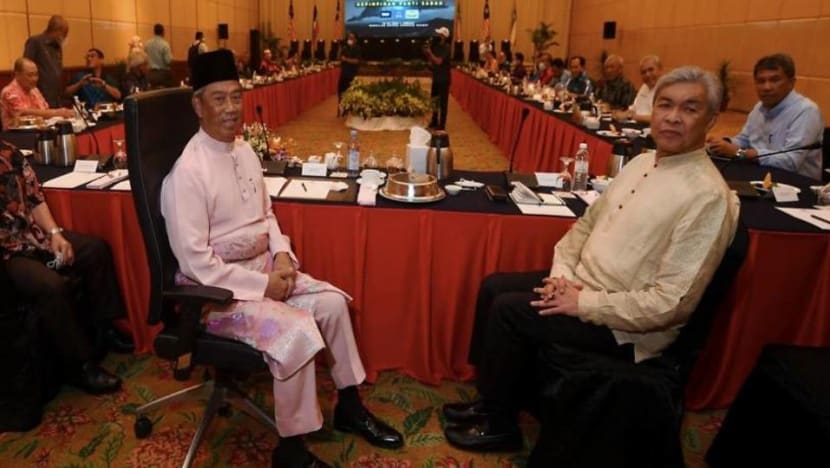
UMNO also feels its members have been sidelined in local government and village security committee appointments.
The only real argument against this line of thinking is that UMNO is not politically strong enough to stand on its own. Malay voters in 2018, barely three years ago, have shown they were willing to throw out UMNO if there is a credible Malay alternative.
UMNO thus must seek to work with other parties to win back political legitimacy but this contest can only come about if a GE were called.
UMNO WANTS A GE BEFORE SITUATION CHANGES FURTHER
On the surface, the timing could not be worse to hold a GE.
With COVID-19 increasing in intensity in all the major urban areas, holding a GE would undoubtedly lead to more cases.
This is not a mere theory. The Sabah state elections held in September last year led to an eventual explosion of COVID-19 cases, even in Peninsula Malaysia, with contact tracing indicating that the hundreds of election workers in the Sabah state elections had caught it in East Malaysia and brought it back with them.
READ: Commentary: Sabah’s surprise results – and how Warisan lost big in state elections
READ: Commentary: Malaysia goes slow on COVID-19 reopening for good reason
The same will happen if a GE is called. There is no such thing as a local campaign as politicians move around the country during the campaign period.
UMNO wants an early GE because it knows it has the upper hand now but the situation can change rapidly.
For now, UMNO’s rural election machinery remains strong and intact but there’s no telling how much ground Bersatu could gain if allowed to expand unchecked in the coming months.
LOOMING CLASH BETWEEN UMNO AND BERSATU
Any serious clash in seat distribution for the coming GE in Malay areas will be between UMNO and Bersatu.
PAS will not be a factor. Many of PAS’s seats are in the traditional Northern Malay states of Terengganu and Kelantan where UMNO is weak.
In the last GE, the key challenge in the Malay areas for UMNO came from Bersatu and PKR.
But PKR is less of a threat now since Azmin Ali’s defection to Bersatu and the break between Mahathir and Anwar Ibrahim, have weakened PKR considerably.
READ: Commentary: Malaysia in a delicate balance after Najib Razak’s conviction
READ: Commentary: Always almost there - will Anwar Ibrahim ever become Prime Minister of Malaysia?
UMNO’ calculation is that they will likely end up with 70 to 80 seats compared to their current 38 if a GE were to be held in the next few months. The additional seats will come from constituencies won by Bersatu, PKR and Warisan in 2018.
Combined with PAS and other smaller parties from East Malaysia, UMNO could well win a clear majority and with this, the Prime Ministership, reverting to a BN government with UMNO at the core.
Bersatu would be finished. They may even have to re-join UMNO.
This is nothing new. In 1988, there was an UMNO-splinter party called Semangat46 (Spirit of 1946), which captured the Kelantan state government but fell apart after two elections, with its members returning to UMNO.
Its founder and leader was Tengku Razaleigh Hamzah, UMNO’s longest serving MP and critic of the current UMNO leadership.
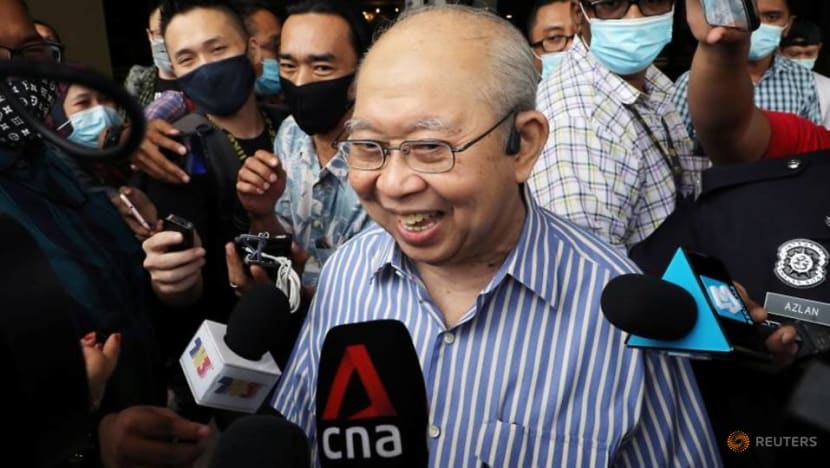
WHAT CAN MUHYIDDIN DO NOW?
Muhyiddin is not without options.
Among many others, he could placate UMNO by appointing an UMNO MP as DPM. He could also carry out a small Cabinet reshuffle, giving senior positions to UMNO.
All these actions may buy him time. But he cannot do what UMNO ultimately wants: For Bersatu to disband and join UMNO, the same path taken by S46.
The three-week break may allow Muhyiddin to influence factions in UMNO and turn the decision around in his favour in time for the UMNO GA.
Muhyiddin was number two in UMNO for many years and he knows all the key UMNO players personally.
READ: Commentary: Muhyiddin Yassin, the all-seasoned politician, who rose to Malaysia’s pinnacle of power
READ: Malaysia rejects application for former PM Mahathir Mohamad's new political party Pejuang
If forced to a corner, Muhyiddin could also resort to what many would term “the unspeakable option”: Ally with PKR, Warisan, and UMNO MPs willing to defect. The numbers make this a plausible scenario.
The only unknown factor is COVID-19. If the spread intensifies in the next two weeks, the UMNO GA may have to be postponed.
So while Muhyiddin’s political career looks tenuous, this is Malaysia. In reality, the games have just begun.
Professor James Chin is Professor of Asian Studies at the University of Tasmania and Senior Fellow at the Jeffrey Cheah Institute on Southeast Asia.
Listen to Malaysians coping with a new wave of COVID-19 share their very different experiences of living through the pandemic in Johor, Kuala Lumpur and Sabah:














